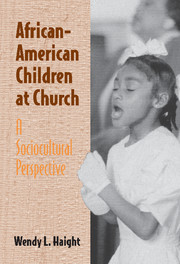Book contents
- Frontmatter
- Contents
- List of Tables
- Acknowledgments
- PART ONE OVERVIEW
- PART TWO PATTERNS OF SOCIALIZATION AND PARTICIPATION
- 4 African-Americans in Salt Lake City: A Historical and Social Overview
- 5 The Teachers
- 6 Adults' Perspectives on Spiritual Socialization
- 7 Narratives Related during Sunday School
- 8 Socialization and Participation through Storytelling
- 9 Adult–Child Verbal Conflicts
- 10 Other Contexts for Socialization and Participation
- PART THREE RELATIONSHIPS OF RESEARCH AND PRACTICE
- PART FOUR CONCLUSION
- References
- Index
7 - Narratives Related during Sunday School
Published online by Cambridge University Press: 10 August 2009
- Frontmatter
- Contents
- List of Tables
- Acknowledgments
- PART ONE OVERVIEW
- PART TWO PATTERNS OF SOCIALIZATION AND PARTICIPATION
- 4 African-Americans in Salt Lake City: A Historical and Social Overview
- 5 The Teachers
- 6 Adults' Perspectives on Spiritual Socialization
- 7 Narratives Related during Sunday School
- 8 Socialization and Participation through Storytelling
- 9 Adult–Child Verbal Conflicts
- 10 Other Contexts for Socialization and Participation
- PART THREE RELATIONSHIPS OF RESEARCH AND PRACTICE
- PART FOUR CONCLUSION
- References
- Index
Summary
During one of our early conversations, Pastor Daniels emphasized the importance of helping children to understand and then to apply biblical concepts to their own everyday lives. He went on to identify storytelling as central to this socialization process:
The most important goal is to teach them [children] Bible principles and to make that applicable in terms of their daily lives. To somehow talk to them about the higher principles like love and faith and patience … and also tell them how they can, practically, from examples, apply that in their own lives. … And, when we tell our own personal stories, there's almost an immediate connection with the … children.
Pastor Daniels's reflections are consistent not just with the observations of other adults presented in chapter 6, but with a large body of literature in African-American studies. From slavery times through the present, African-Americans have derived strength and resilience from culturally distinct, spiritual belief systems developed within the African-American church. Through sustained participation over a lifetime in cultural practices such as storytelling, spiritual beliefs are elaborated and linked to the trials and joys of individuals' everyday lives.
The goal of the next two chapters is to describe children's participation in storytelling at First Baptist Church.
- Type
- Chapter
- Information
- African-American Children at ChurchA Sociocultural Perspective, pp. 86 - 104Publisher: Cambridge University PressPrint publication year: 2001



